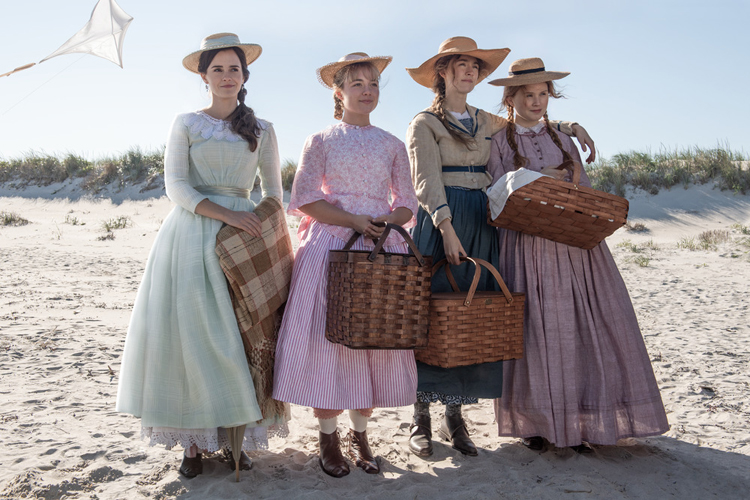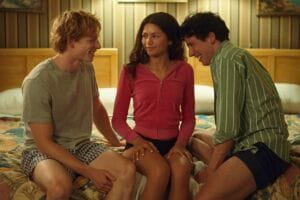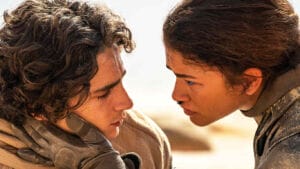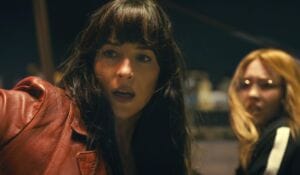Greta Gerwig’s Little Women is (at least) the sixteenth time that the story has been committed to film. Its adaptations have taken many forms over the years: TV miniseries, modern retellings, musicals, and even anime. Gerwig’s adaptation, on the other hand, doesn’t stray far from Louisa May Alcott’s novel—so what’s it bringing to the table? How does it differentiate itself from what came before? It’s simple, really.
No, that’s the answer—it’s simple. Or Gerwig makes it look simple. Her background in mumblecore (let’s not forget that she co-directed mumblecore classic Nights and Weekends nine years before she directed Lady Bird) continues to inform her stylistic choices as a filmmaker. Lady Bird had mumblecore sensibilities, with its naturalistic dialogue and personal stakes, but its structure was too rigid to indulge in the genre’s improvisational tone on more than an intra-scene level. The story that Gerwig wanted to tell was too important to let the performances redefine. But with Little Women, the story is already laid out for her, giving her room to let the cast reshape the tale.
That’s where the movie’s simplicity comes from. On a visual level, Little Women is a constant, gentle reminder that the people are the story. Gerwig keeps her actors centered; if they dance away, her camera catches up with them. Characters are often framed in medium long shots, which gives the cast opportunity to act with their whole bodies, in nearly full view of the lens. With Gerwig channeling her energy into a humble gaze at human conduct, the actors are free to author the story through their perceptions of their characters.
They do so with mumblecore gusto. Scenes with multiple characters—especially ones with all four March sisters—are bathed in natural, interrupting banter. Some dialogue is lifted from the novel; some seems improvised in the moment. The controlled chaos of conversational spontaneity recalls, as odd as it sounds, the dynamics of It’s Always Sunny in Philadelphia: everyone wants to say and do and loudly be in their scenes, and Gerwig fosters the space to let it happen.
Each member of the cast deserves their own hundreds of words, but no one exemplifies their actor-as-auteur capabilities like Florence Pugh. She takes the character of Amy March, usually a foil or even somewhat of an antagonist to Jo, and transforms her into the movie’s most compelling presence. Pugh portrays Amy from preteen to adult woman—her talent dispels any age disbelief—so that we know where her foibles, tics, and maladroit behaviors stem from, and recognize the personal difficulties that inflame them. In the context of Pugh’s relentless humanizing, Amy’s decisions and desires are vindicated in a way that Little Women has scarcely managed before, in any medium. Pugh leads by example in the cast’s reinterpretive efforts.
Truly, though, all of the actors sell their character iterations. They even temper unrelated flaws: if it weren’t for the cast nailing every emotional beat, the film might’ve felt overscored. Alexandre Desplat’s music is fitting and lovely, but its emotional notes verge on blatant—or that would’ve been the case, if the actors weren’t capable of setting the mood so authoritatively. A score that could’ve overborne instead accompanies.
Given how touching the infinitesimal changes to Little Women add up to be, Gerwig’s non-simple additions are all the more puzzling. She reconstructs the story into a series of flashbacks and flash-forwards, which helps emphasize narrative mirroring, but robs certain emotions of time to sit—a serious moment will flash back to a happy memory, for example, or a victory will abruptly cut to a loss. Gerwig creates the impression of life’s duality through this process, but at the same time, it muddles (or, in one case, downright confuses) the journeys that actors are taking their characters on. Gerwig has described this approach to Little Women as “cubist”, but the movie doesn’t need hard edges and abstractions. It’s simply magnificent when it lets its actors navigate their winding roads.
★★★★½ (4.5/5)




